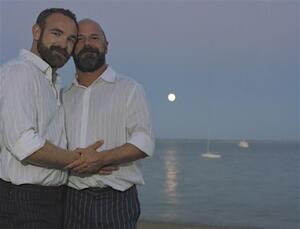Know Hope: Learning Civil Rights with Andrew Sullivan
Andrew Sullivan came into my life when I entered high school. At that time, he was writing a blog for the Daily Beast called “The Dish” and I read it Every. Single. Day. He wrote about politics in Washington, the Iraq War, different facets of American culture, conservatism, Christianity. But what he is best known for his role in the fight for same sex marriage.
Sullivan was one of the first people to put forth an argument for such an idea. In 1989, he wrote a cover piece for The New Republic entitled “Here Comes The Groom: A (Conservative) Case for Gay Marriage.” In it, he puts forth many of the arguments that have become mainstream in the fight for same marriage. At the time, he was written off by traditional conservatives and the gay left alike. In time, however, his argument became the basis for the most mainstream civil rights movement of the 21st century.
Growing up in the liberal, gay, progressive haven of San Francisco, the argument for same sex marriage was nothing new for me. Yet Sullivan offered a perspective I had rarely heard posed, and posed so eloquently. When I started reading The Dish, what stood out to me was how he talked about same sex marriage and culture as both a practicing Christian and a political conservative. I had never heard a voice like his. He wrote with passion but with an even head, and it taught me an important lesson in not letting an issue or idea you support create your whole identity. He was a cornerstone in the gay rights movement but it didn’t stop him from criticizing the “gay rights establishment” for accepting a Non-Discrimination Act that excluded gender identity, or criticizing San Francisco techie liberal culture for the firing of Mozilla CEO Brendan Eich for donating to anti-same sex marriage campaigns. He cares passionately about same sex marriage, but he also cares about how it is won. Sullivan has been unwavering in his insistence that equality must be gained through understanding rather than militancy.
The piece he wrote about Brendan Eich, “The Quality of Mercy” was one that changed my perspective on social justice forever. In it, he outlines what happened to Eich as a case of political discrimination, period. He goes on to explain why events like these are important to the gay rights movement. He ends the piece by saying:
"For a decade and half, we have fought the battle for equal dignity for gay people with sincerity, openness, toleration and reason. It appears increasingly as if we will have to fight and fight again to prevent this precious and highly successful legacy from being hijacked by a righteous, absolutely certain, and often hateful mob. We are better than this. And we must not give in to it."
Those words stuck with me, and helped me learn something about my own methods of argumentation. I care deeply about social justice, but I used to be a bully about it. Since reading this piece and continuing to read Sullivan’s blog, I’ve tried to become a better listener, more open, more sincere. I have got a long way to go and I still often feel so disheartened and frustrated when I hear people say things I think are positively wrong. But Andrew Sullivan has got me convinced that with enough time and with enough empathy, a movement can be won, just as he saw his once fringe opinion in the 1980s become the law of the land in 37 states by 2015. As he says, “know hope.”
This piece was written as part of JWA’s Rising Voices Fellowship.






